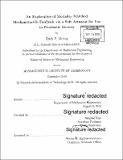An exploration of modality matched mechanotactile feedback via a soft actuator for use in prosthetic devices
Author(s)
Meinig, Erich P.
Download1138944956-MIT.pdf (6.000Mb)
Other Contributors
Massachusetts Institute of Technology. Department of Mechanical Engineering.
Advisor
Sangbae Kim.
Terms of use
Metadata
Show full item recordAbstract
The loss of a hand is often a profoundly traumatic experience and can often mean the interruption of the closed-loop feedback system within the brain that is responsible for motor control of the hand and the sensory feedback from the hand. The loss of sensory feedback can significantly affect the quality of life of persons with amputations and current prostheses do not provide any sort of sensory feedback and thus users must rely on visual feedback for basic grasping tasks. This excessive dependence on visual feedback often leads to reduced embodiment of the prosthesis for users, reduced dexterity, and an overall diminished satisfaction with the prosthetic device, which can ultimately lead to device abandonment. This thesis examines whether a soft actuator made out of elastomer can be used as a way to passively transmit mechanotactile pressure noninvasively and details the design process of the actuator and a model prosthetic hand and a model gripper that incorporates the actuator. A human study was also designed to evaluate the efficiency of the feedback system and whether the feedback system facilitates learning a stable internal model of the gripper force control.
Description
Thesis: S.M., Massachusetts Institute of Technology, Department of Mechanical Engineering, 2019 Cataloged from PDF version of thesis. Includes bibliographical references (pages 57-61).
Date issued
2019Department
Massachusetts Institute of Technology. Department of Mechanical EngineeringPublisher
Massachusetts Institute of Technology
Keywords
Mechanical Engineering.